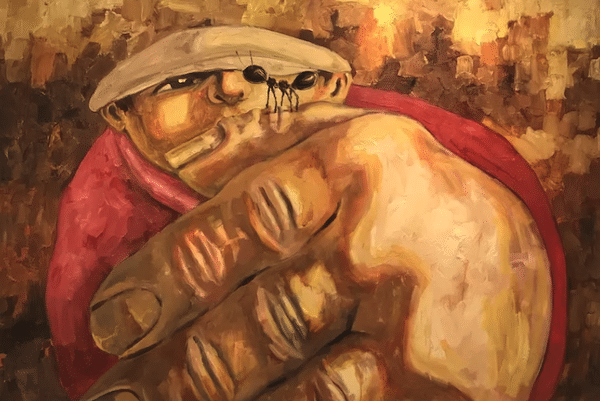Dear friends,
Greetings from the desk of Tricontinental: Institute for Social Research.
One of the most stunning events of the past few months has been the fall of Damascus. This fall had initially been expected over a decade ago, when rebel armies funded by Qatar, Turkey, Saudi Arabia, and the United States crowded around the edges of Syria and threatened then President Bashar al-Assad’s government. These armies, backed by rich and powerful countries, were comprised of a range of actors, including:
- swaths of people who were angered by the economic distress caused by the opening up of the economy and the subsequent devastation of small manufacturing businesses, which were suffering in the face of the emerging might of Turkish manufacturing;
- the peasantry in the north, frustrated by the government’s lack of a proper response to the long drought that forced them into the northern cities of Aleppo and Idlib;
- sectors of the secular petty bourgeoisie discontent with the failure of the Damascus Spring of 2000—01, which had initially promised political reforms stemming from the muntadayāt (forum discussions) held across the country;
- a deeply aggrieved Syrian Muslim Brotherhood, formed out of the pious petty bourgeoisie, which had been crushed in 1982 and re-emerged after being inspired by the role the Brotherhood played in the 2010—11 protests in Tunisia and Egypt;
- eager Islamist forces that had been trained by al-Qaeda in Iraq and wanted to fly the black flag of jihadism from the highest parapets in Damascus.
Despite the failure of these factions of the Syrian opposition in 2011, it was many of these same forces that succeeded in overthrowing Assad’s government on 7 December 2024.
Just over a decade ago, Assad’s government remained in power largely because of support from Iran and Russia, but also because of the involvement—to a lesser extent—of neighbouring Iraq and Hezbollah (Lebanon). Assad did not have the stomach for the contest. He became president in 2000 after the death of his father, Hafez al-Assad, who took office through a military coup in 1971. Bashar al-Assad had a privileged upbringing and studied to be an ophthalmologist in the United Kingdom. When the rebel armies neared Damascus in December of this year, Assad fled to Moscow with his family, claiming that he wanted to retire from politics and resume his career as an ophthalmologist. He did not make a statement to his people telling them to be brave or that his forces would fight another day. There were no comforting words. He left quietly in the same way he appeared, his country abandoned. A few days later, on Telegram, al-Assad released a text but was timid.
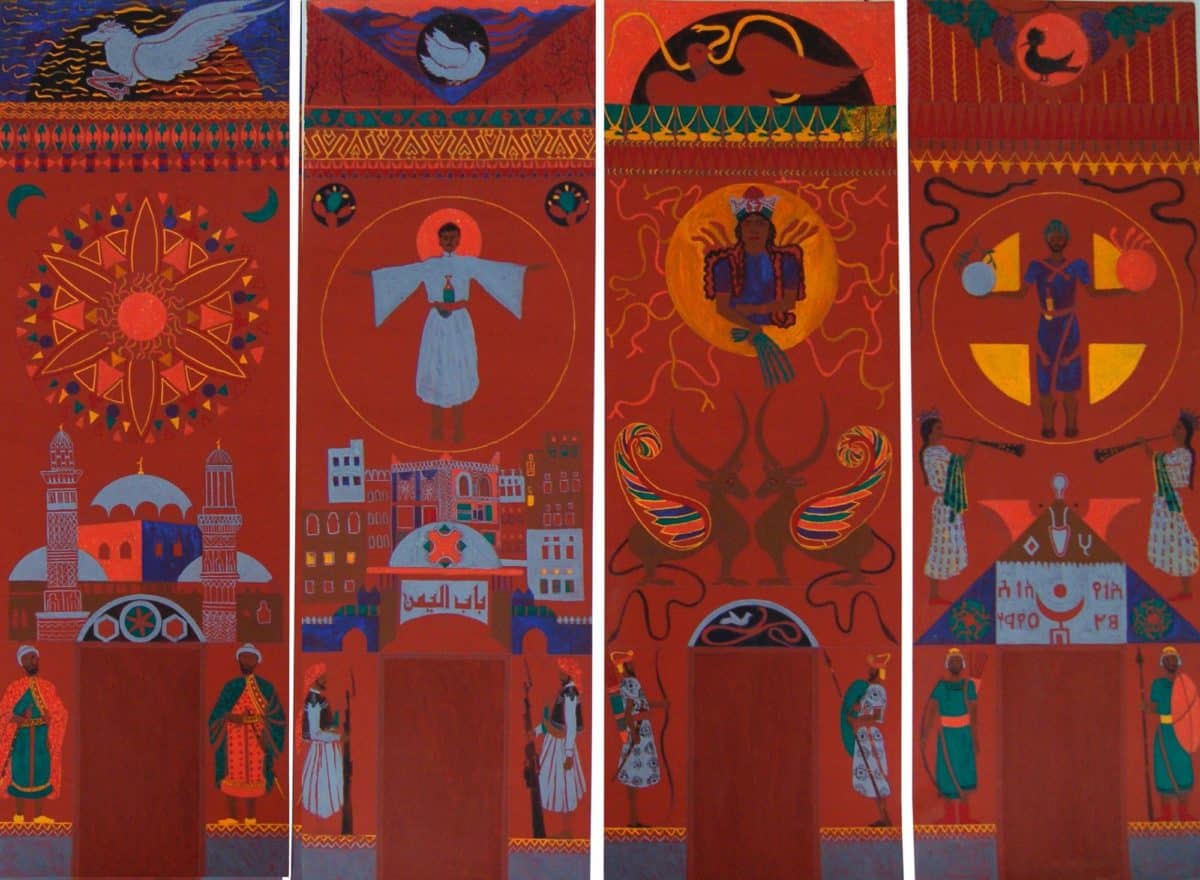
Hakim al-Akel (Yemen), The Symbolic History of Arab Joy (Arabia Felix), 1994.
After being defeated by Syrian, Iranian, and Russian forces in 2014, the Syrian rebels regrouped in the city of Idlib, not far from Turkey’s border with Syria. That is where the main opposition force broke with al-Qaeda in 2016, took over the local councils, and shaped itself as the only leader of the anti-Assad campaign. This group, Hayat Tahrir al-Sham (Organisation for the Liberation of the Levant, or HTS), is now in charge in Damascus.
Originating directly from al-Qaeda in Iraq, HTS has not been able to shed those roots and remains a deeply sectarian body with ambitions to eventually turn Syria into a caliphate. Since his time in Iraq and northern Syria, HTS leader Abu Mohammed al-Jolani developed a reputation of great brutality toward the large number of minority groups in Syria (specifically Alawites, Armenians, Kurds, Shi’ites), who he regarded as apostates. Al-Jolani is well-aware of his reputation, but he has remarkably altered the way he presents himself. He has shed the trappings of his al-Qaeda days; he trimmed his beard, dresses in a nondescript khaki uniform, and learned to talk to the media in measured tones. In an exclusive interview with CNN released just as his forces took Damascus, al-Jolani recalled past murderous acts committed in his name merely as youthful indiscretions. It was as if he had been trained by a public relations company. No longer the al-Qaeda madman, al-Jolani is now being presented as a Syrian democrat.
On 12 December, I spoke to two friends from minority communities in different parts of Syria. Both said that they fear for their lives. They understand that though there will be a period of jubilation and calm, they will eventually face severe attacks and have already begun hearing reports of small-scale attacks against Alawites and Shia families in their network. Another friend reminded me that there was calm in Iraq after the fall of Saddam Hussein’s government in 2003; several weeks later, the insurgency began. Could such an insurgency of former government forces take place in Syria after they have recomposed from their state’s hasty fall? It is impossible to know what the social fabric of the new Syria will be like given the character of the people who have taken power. This will be especially true if even a fraction of those seven million Syrians who were displaced during the war return home and seek revenge for what they will surely see as the mistreatment that forced them overseas. No war of this kind ends with peace. There are many scores yet to settle.
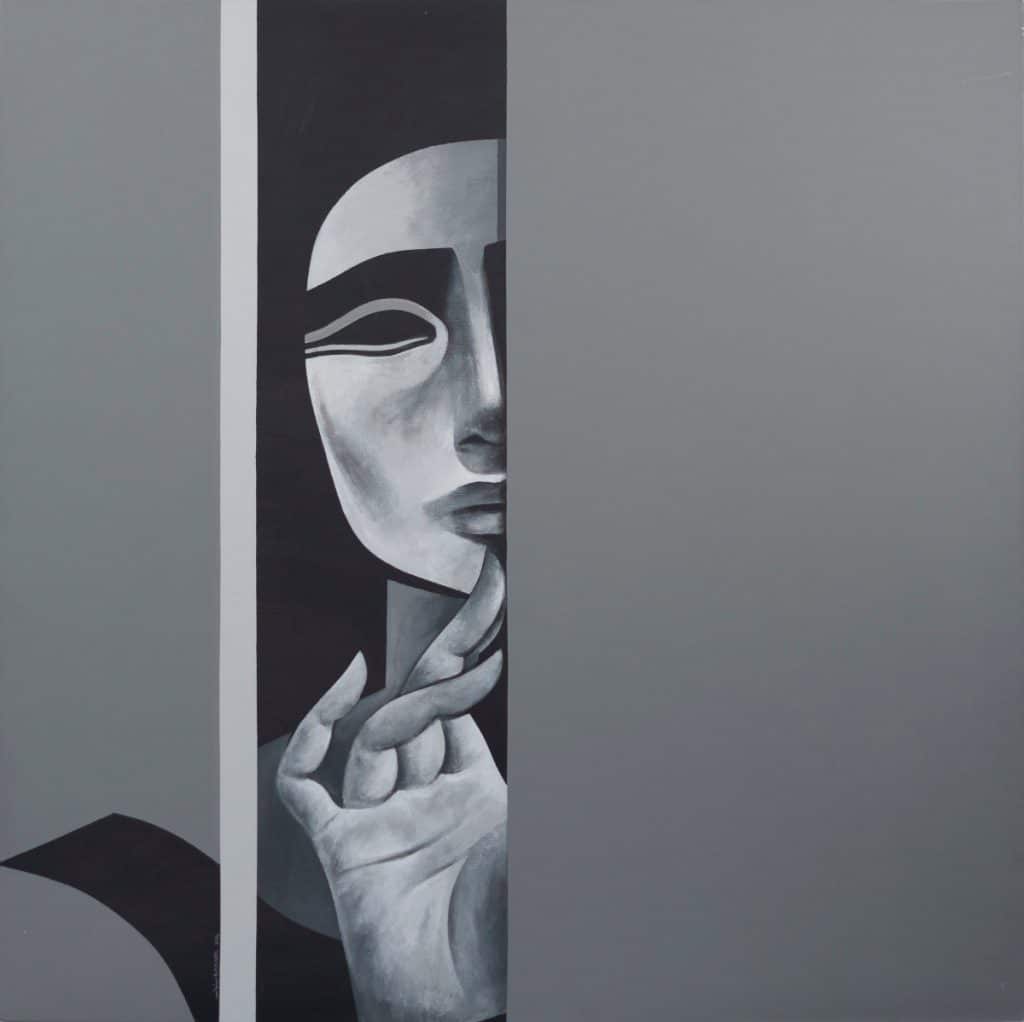
Safwan Dahoul (Syria), Dream 92, 2014.
Without detracting attention from the Syrian people and their well-being, we must also understand what this change of government means for the region and the world. Let us take the implications sequentially, starting with Israel and ending with the Sahel region in Africa.
- Israel. Taking advantage of the decade-long civil war in Syria, Israel has bombed Syrian military bases on a regular basis to degrade both the Syrian Arab Army (SAA) and its allies (notably, Iran and Hezbollah). Over the past year, during its escalation of the genocide against Palestinians, Israel has also increased its bombing of any military facility it believes is being used to resupply Iran and Hezbollah. Israel then invaded Lebanon to weaken Hezbollah, which it achieved by assassinating Hezbollah’s long-time leader, Sayyed Hassan Nasrallah, and by invading southern Lebanon, where Hezbollah was rooted. As if coordinated, Israel provided air support to HTS as it moved out of Idlib, bombing Syrian military facilities and army posts to demoralise the SAA. When HTS took Damascus, Israel strengthened its Division 210 in the Occupied Golan Heights (seized in 1973) and then invaded the United Nations buffer zone (set up in 1974). Israeli tanks proceeded outside the buffer zone and came very close to Damascus. HTS did not contest this occupation of Syria at any point.
- Turkey. The Turkish government provided military and political support to the 2011 rebellion from its inception and hosted the exiled Syrian Muslim Brotherhood government in Istanbul. In 2020, when the SAA moved against the rebels in Idlib, Turkey invaded Syria to force an agreement that the city would not be harmed. Turkey also enabled the military training of most of the fighters who proceeded down highway M5 to Damascus and provided military equipment to the armies to battle the Kurds in the north and the SAA in the south. It was through Turkey that various Central Asian Islamists joined the HTS fight, including Uyghurs from China. When Turkey invaded Syria twice over the past decade, it held Syrian territory that it claimed was its historical land. This territory will not return to Syria under the HTS government.
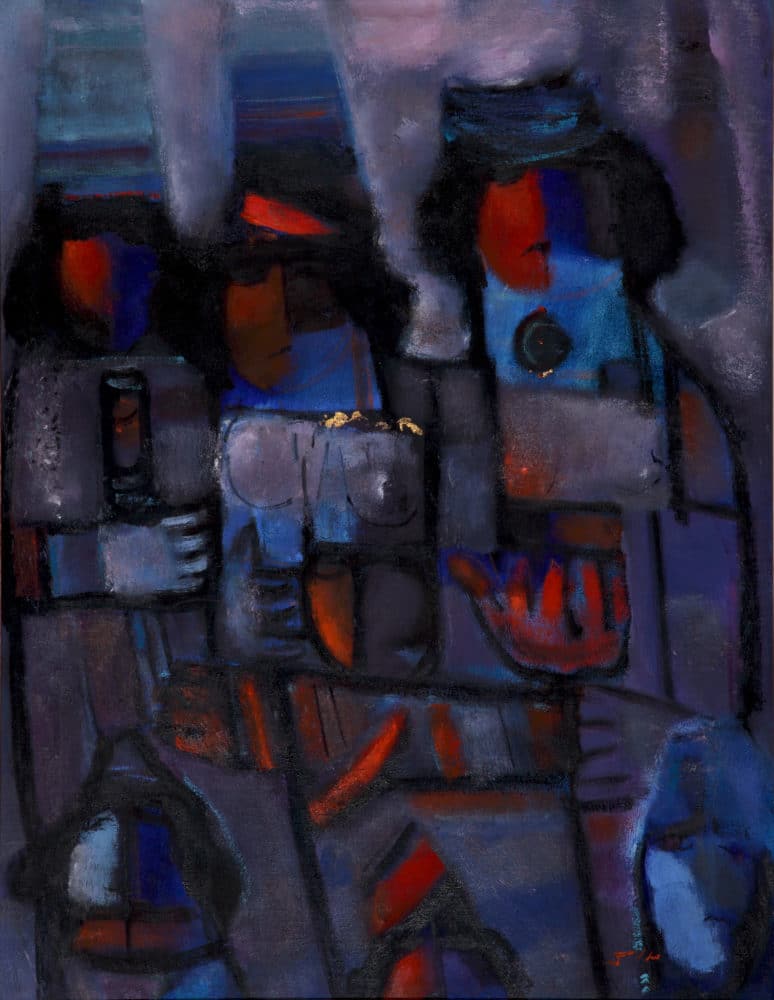
Fateh al-Moudarres (Syria), Child of Palestine, 1981.
- Lebanon and Iraq. After the fall of Saddam Hussein’s government in 2003, Iran built a land bridge to supply its allies in both Lebanon (Hezbollah) and Syria. With the change of government in Syria, resupplying Hezbollah will become difficult. Both Lebanon and Iraq will now border a country ruled by a former al-Qaeda affiliate. While it is not immediately clear what this means for the region, it is likely that there will be an emboldened al-Qaeda presence that wants to undermine the role of the Shia in these countries.
- Palestine. The implications for the genocide in Palestine and for the struggle for Palestinian liberation are extraordinary. Given Israel’s role in undermining Assad’s military on behalf of HTS, it is unlikely that al-Jolani will contest Israel’s occupation of Palestine or allow Iran to resupply Hezbollah or Hamas. Despite his name, which comes from the Golan, it is inconceivable that al-Jolani will fight to regain the Golan Heights for Syria. Israel’s ‘buffers’ in Lebanon and Syria add to the regional complacency with its actions achieved by events such as its peace treaties with Egypt (1979) and Jordan (1994). No neighbour of Israel will pose a threat to it at this time. The Palestinian struggle is already experiencing great isolation from these developments. Resistance will continue, but there will be no neighbour to provide access to the means for resistance.
- The Sahel. Since the United States and Israel are basically one country when it comes to geopolitics, Israel’s victory is a victory for the United States. The change of government in Syria has not only weakened Iran in the short term but has also weakened Russia (a long-term strategic goal of the United States), which previously used Syrian airports to refuel its supply planes en route to various African countries. It is no longer possible for Russia to use these bases, and it remains unclear where Russian military aircraft will be able to refuel for journeys into the region, notably to countries in the Sahel. This will provide the United States with an opportunity to push the countries that border the Sahel, such as Nigeria and Benin, to launch operations against the governments of Burkina Faso, Mali, and Niger. This will require a close watch.
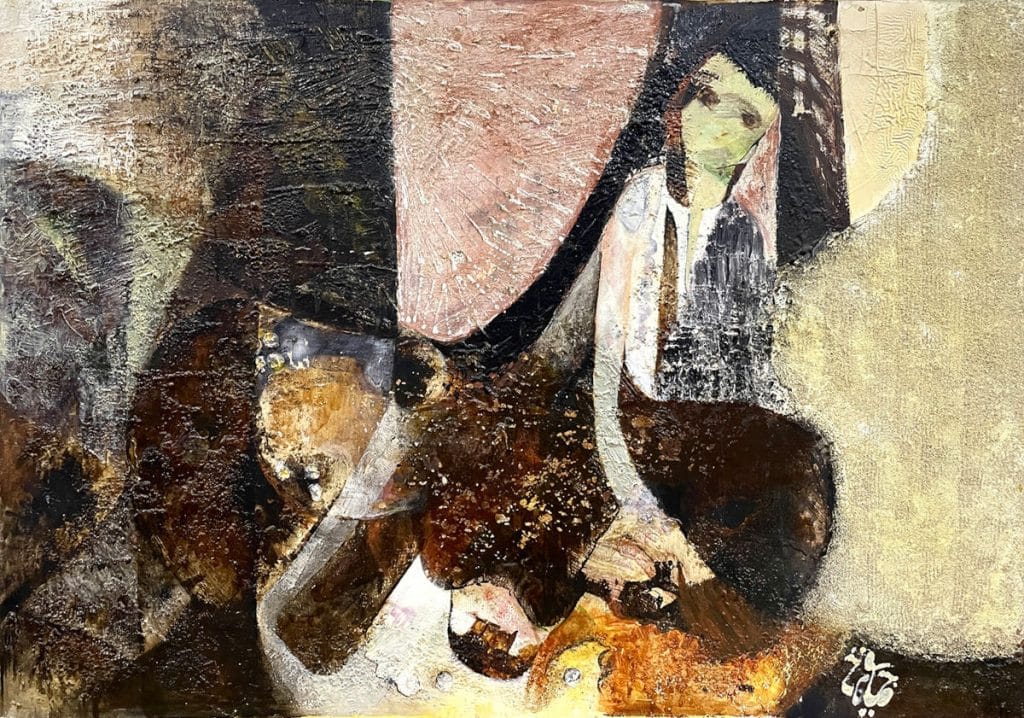
Djamila Bent Mohamed (Algeria), Palestine, 1974.
In July 1958, several poets organised a festival in Akka (occupied Palestine ’48). One of the participating poets, David Semah, wrote ‘Akhi Tawfiq’ (My Brother Tawfiq), dedicated to the Palestinian communist poet Tawfiq Zayyad who was in an Israeli prison at the time of the festival. Semah’s poem grounds us in the sensibility that is so sorely needed in our times:
If they sow skulls in its dirt
Our harvest will be hope and light.
Warmly,
Vijay

